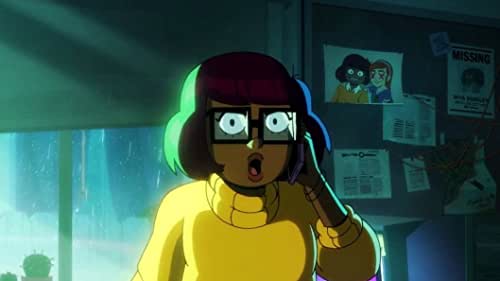Review: Vulgar Velma! A Look into the New Scooby-Doo Spinoff

I watched this show with my friend, and throughout the episodes, we were howling with laughter, though not at the jokes interspersed in the adult-aimed show – but at the absurdity of the writing and how awful it was.
January 23, 2023
Back in October, Mindy Kaling (most known for her role on The Office) announced that she would be producing and starring in a spinoff Scooby-Doo show called Velma focusing on the background of Velma.
I had written an article detailing all the changes that were to be made back then. When the announcements were first made, thoughts were very polarized, with some people praising the changes, and others being horrified. Now that the show has actually been released on HBO Max, it’s much more universally hated by both sides. Many news sites have called it “The most hated Television show”, and at the time of writing, the rating for the show is at a 1.3/10 on IMDB.
In a time when no one can agree on anything, it’s mind-blowing that people from every community are shredding the show to pieces – POC, white, LGBTQ+, old, young, new fans, old fans. I started watching this show with some friends, and let’s just say, I wholeheartedly agree with all the negative reviews and think the rating should be even lower. Here’s why.
I watched this show with my friend, and throughout the episodes, we were howling with laughter, though not at the jokes interspersed in the adult-aimed show – but at the absurdity of the writing and how awful it was. Kaling’s script had characters trying to break the fourth wall by saying lines like “If this was a TV show…” or “Normally in a sitcom…” which were obvious and failed attempts at some kind of warped humor.
Most of my friends’ and my thoughts ranged from “Shut up” directed at the characters on-screen to “What the heck just happened” to “Who green-lit this stupid show?” Any social commentary Kaling has attempted has fallen flat or is an already done-to-death trope such as making white Fred Jones “guilty because he’s white and rich”.
The Characters:
Oh boy, where to begin? I never like the idea of adding diversity to classic and established casts, because it always feels like a cheap attempt at getting token diversity. Velma is no exception. All three of the characters with changed races made me feel vaguely uncomfortable the way they were portrayed.
Part of Daphne Blake’s (Constance Wu) arc is having romantic feelings for Velma, and being adopted – both of which feel like cheap trope cards aiming to add substance to her new Asian race and end up doing the opposite. Daphne as a character has also changed from the friendly personality to a very typical “mean popular girl” attitude.
Norville Rogers, AKA Shaggy (Sam Richardson), who has always been known as the “stoner” character from every other Scooby-Doo show/movie, now has a strangely prominent trait of being against drugs. This also feels problematic, and as a way to escape being called racist for making the stoner African-American.
Fred Jones (Glenn Howerton) is the only one of the main gang who remained white, though his character has also undergone some major changes. Instead of being the leader of the Mystery solving gang, Fred has been changed to be an insecure, spoiled and childish boy who can’t so much as cut his own steak. There is also something to be said about how Velma has a crush on him as a South Asian and is looking for validation and acceptance from a white boy.
The Adult themes:
Back when the show was first announced, Kaling got a lot of backlash for making plans for Velma to be geared more for adults than the kid-friendly audience Scooby-Doo has always been for. Immediately after the opening of the first episode, viewers are met with cockroaches mating in a human-like position, and then shown a scene with all the girls in the locker room showers.
Keeping in mind that Velma is supposed to act as a sort of prequel before the main events of other Scooby-Doo shows, this would put the characters to be around 15–16 years old. It’s incredibly concerning and problematic that these are kids, and it feels wrong on several levels to have Daphne discussing still being a virgin and Fred being insecure over being a late bloomer.
Another problem I saw with the show is how mental health is portrayed. Velma is explained (in a poorly done exposition dump) to have severe guilt over her mother, Diya’s disappearance two years prior, and gets hallucinations triggered by these feelings. It is implied that she has attempted to get help from her father for it, but he doesn’t acknowledge it until she hallucinates right in front of him. Which he still handles badly by essentially blaming Velma for her leaving, and that somehow makes Velma feel better?
Plot:
It feels like at any one point there’s three different story arcs happening, but each one feels like it’s only lasting a few minutes before it’s just brushed off.
The main storylines often feel like they are second fiddle to the drama of Norville liking Velma who likes both Fred and Daphne, the latter of whom likes Velma back. Like I said, it’s pretty poorly written.
Other than finding the bodies and getting Diya’s case file, there hasn’t been any real breakthrough in the first few episodes in either the murder mystery or Velma searching for her mother. For storylines that are supposed to be at the forefront, they sure seem to take a backseat.
In my original article, I ended by saying it was unclear whether Velma would be a laughingstock of issues or a success. Judging by endless negative reviews, and my own opinion, it’s safe to say Mindy Kaling’s Velma is solidly in the “laughingstock of issues” zone. For all the hate though, it has been confirmed to be getting a second season, likely due to everyone watching it just to see if it is truly as bad as everyone says.

